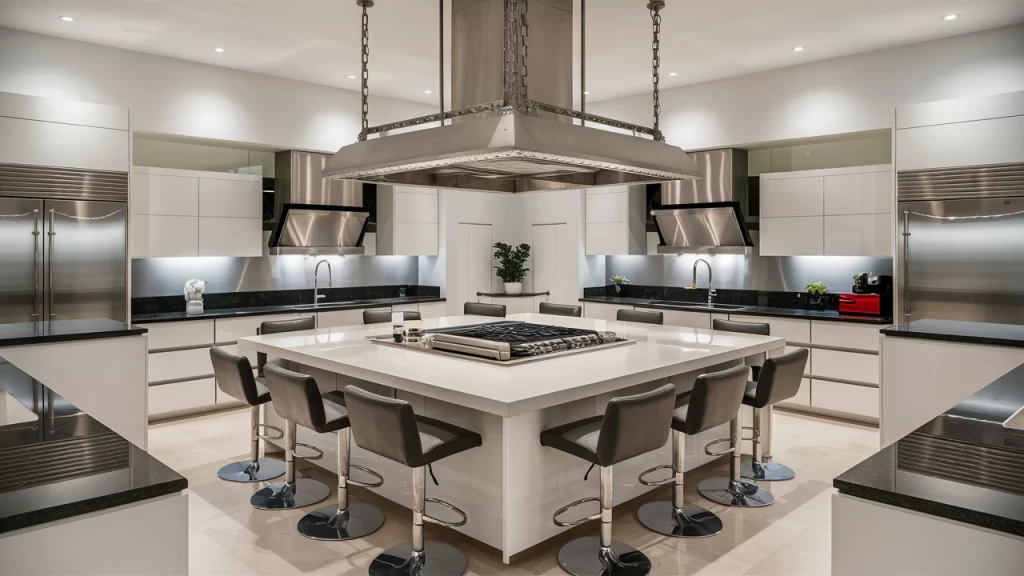AI Kitchen Design
In the realm of home design, the kitchen stands as the heart of the household—a space where culinary creations merge with social interactions and family gatherings. As technology continues to evolve, so too does the art of kitchen design. Enter Artificial Intelligence (AI), the transformative force reshaping the landscape of kitchen design, promising unparalleled levels of efficiency, personalization, and innovation. In this extensive exploration, we delve into the multifaceted realm of AI kitchen design, uncovering its myriad applications, benefits, and the exciting potential it holds for the future of our homes.

Content
The Intersection of Tradition and Technology
Traditionally, kitchen design has been guided by principles of functionality, aesthetics, and practicality. However, with the advent of AI technology, these principles are being augmented and enhanced in ways previously unimaginable. AI seamlessly integrates with traditional design practices, offering a dynamic framework that adapts to the evolving needs and preferences of homeowners.
Personalization Redefined
At the core of AI kitchen design lies the concept of personalization. No two individuals have identical tastes, lifestyles, or culinary habits, and AI leverages this diversity to craft bespoke kitchen environments tailored to each user. By analyzing user data, such as cooking habits, dietary preferences, and lifestyle patterns, AI algorithms generate personalized design recommendations that optimize space utilization, workflow efficiency, and aesthetic appeal.
Efficiency and Optimization
One of the most compelling aspects of AI kitchen design is its ability to enhance efficiency and optimize functionality. AI-powered systems can analyze kitchen layouts, appliance configurations, and storage solutions to maximize space utilization and streamline workflow processes. From smart storage solutions that adapt to changing needs to intelligent appliance placement that minimizes energy consumption, AI optimizes every aspect of the kitchen experience.
Seamless Integration of Technology
In today’s digitally connected world, technology permeates every aspect of our lives, and the kitchen is no exception. AI facilitates the seamless integration of technology into kitchen design, transforming ordinary cooking spaces into high-tech culinary hubs. From voice-activated appliances and smart refrigerators to interactive cooking assistants and automated meal planning systems, AI enhances the kitchen experience, making cooking more intuitive, efficient, and enjoyable.
Sustainability and Environmental Consciousness
As global awareness of environmental issues continues to grow, sustainability has become a central concern in kitchen design. AI plays a pivotal role in promoting sustainability by optimizing energy usage, reducing waste, and encouraging eco-friendly practices. Through predictive analytics and machine learning algorithms, AI identifies opportunities for energy savings, recommends sustainable materials and appliances, and promotes environmentally conscious behaviors among users.
Collaboration and Creativity
While AI technology offers invaluable tools and resources, it does not replace the human touch in kitchen design. Instead, it fosters collaboration and creativity between homeowners, designers, and AI systems. By providing data-driven insights and design recommendations, AI empowers homeowners to explore new possibilities, experiment with different layouts and configurations, and co-create kitchen environments that reflect their unique personalities and preferences.
Overcoming Challenges and Ethical Considerations
Despite its numerous benefits, AI kitchen design also presents challenges and ethical considerations that warrant careful consideration. Privacy concerns related to data collection and usage, biases inherent in algorithmic decision-making, and the displacement of human designers are some of the key issues that need to be addressed. However, with proper safeguards and ethical guidelines in place, AI has the potential to revolutionize kitchen design while preserving human creativity and autonomy.
Conclusion: A Glimpse into the Future
In conclusion, AI technology is poised to revolutionize the future of kitchen design, offering unparalleled levels of personalization, efficiency, and innovation. From personalized design recommendations and optimized workflow processes to sustainable practices and collaborative creativity, AI transforms the kitchen into a dynamic and adaptive space that evolves with the needs and preferences of its users. As we continue to embrace the possibilities of AI in kitchen design, we embark on an exciting journey towards a future where culinary creativity knows no bounds.

I am Scott Miller and my love is writing about home improvement. I write mostly about home ideas, but also share some tips and tricks that can make your life easier when it comes to getting things done in the house.












